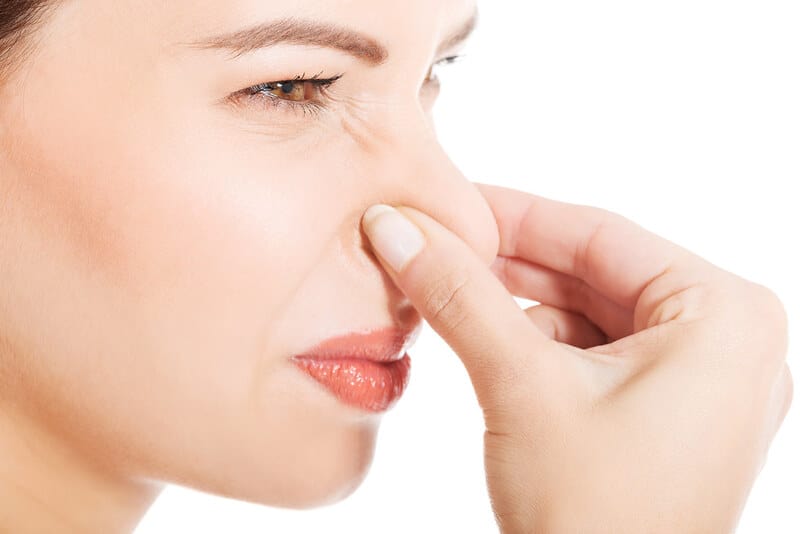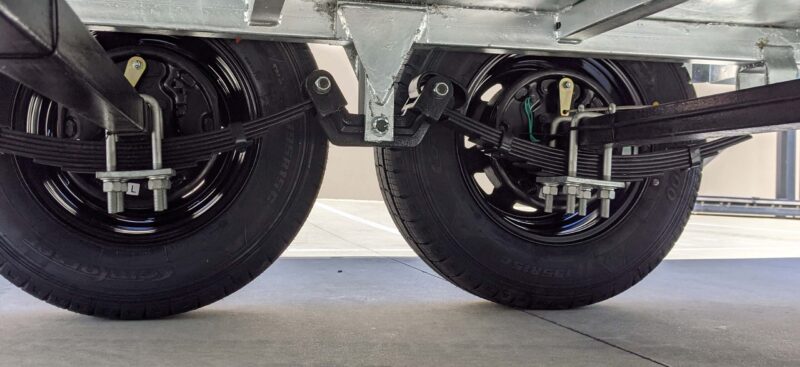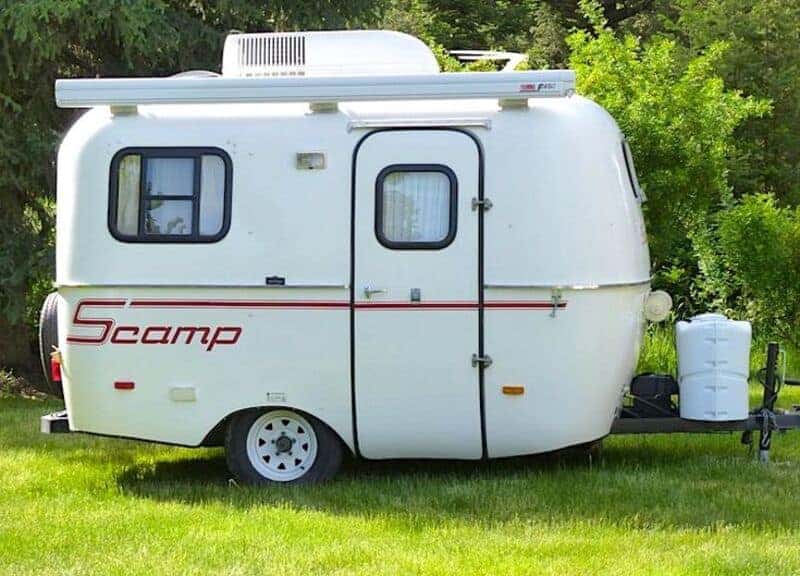There’s nothing more off-putting than an RV toilet smells. Sometimes finding the solution can be as simple as a good cleaning. However, “bigger deal” problems affect the aromas in your RV. Let’s look at some of the reasons your RV toilet smells and then see the best ways to get rid of that RV toilet odor.
What is That Smell? It’s Your RV Toilet
There could be many reasons for the RV toilet smells. So let’s dig a little deeper into the stink to see why this happens and how you can remedy the situation.
11 Possible Reasons Your RV Smells PLUS Solutions
Problem 1: The Bowl Needs to be Cleaned
Hopefully, you clean your toilet bowl often enough that your RV toilet smells are contained. If it is, a simple solution will provide you with relief from the smell.
The Solution: Clean the Bowl and Area Surrounding the Toilet
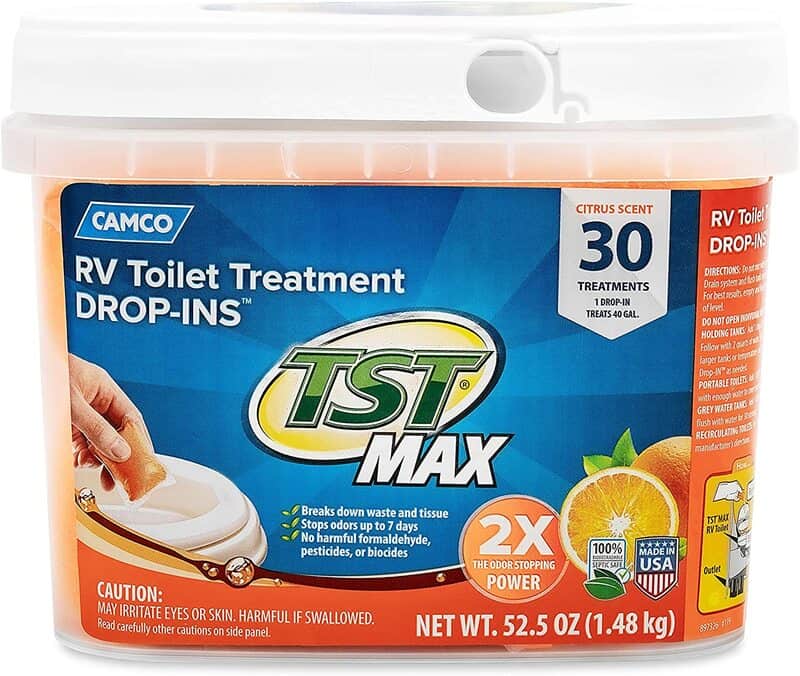
Ensure you thoroughly clean your toilet bowl at least once or twice weekly. Be sure and avoid abrasive cleaners that could scratch the plastic bowl. Some of the best cleaners include Unique RV Toilet Bowl Cleaner and Camco TST Max RV Toilet Treatment Drop-Ins.
Both are specifically designed for RV toilets with no bleach and won’t damage seals or valves. In fact, the cleaner will help to lubricate your toilet seals.
A simple solution of baking soda and vinegar is also a great way to clean your toilet without using anything caustic and provides a great RV toilet smell fix.
Problem 2: The Bowl Isn’t Sealing Properly
When the seals are worn out, there’ll be apparent liquid and gaseous odors, which could be why your RV toilet smells. Replacing a seal can be a DIY project at very little expense. Check out some YouTube video “how-tos” to give you a boost of confidence.
The Solution: Lubricate the Seal or Replace it
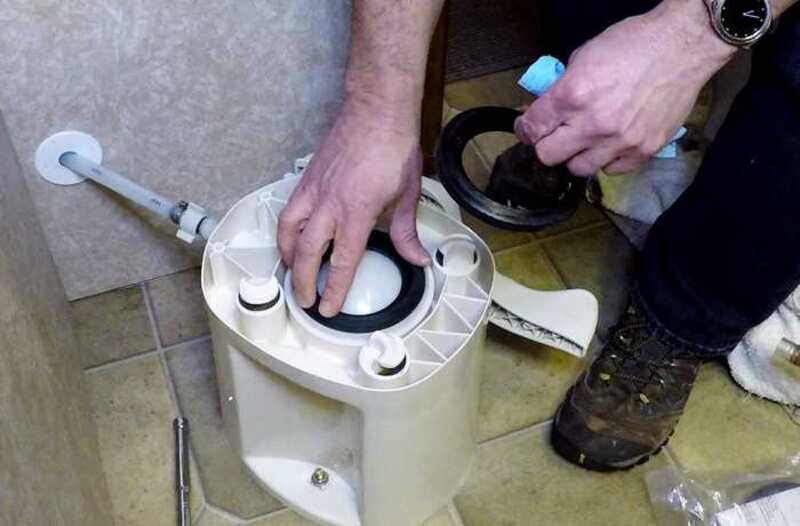
Most RV toilets have basic gaskets or seals that can easily be lubricated or replaced.
This lubricant penetrates the toilet seal and helps prevent waste from sticking. Petroleum-free seal lubricants can be used on toilet seals and holding tanks.
Problem 3: Blocked Vent Pipe
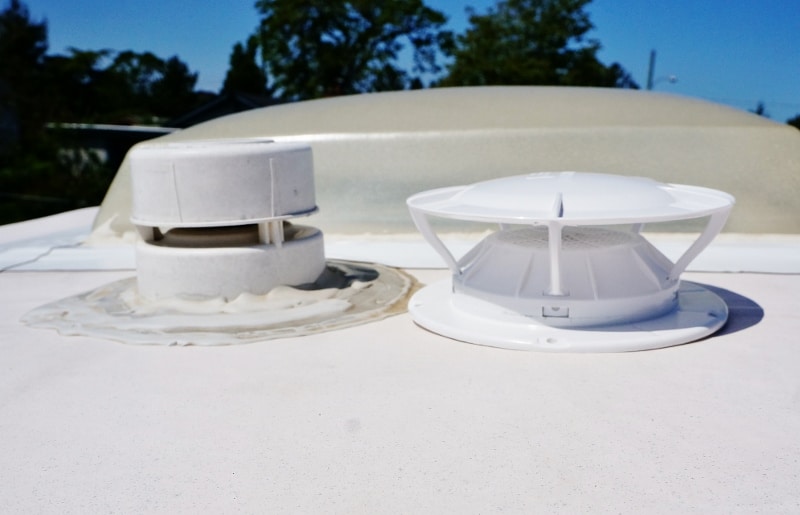
The purpose of an RV plumbing vent pipe is to allow tank odors to be vented outside and allow air to enter and exit the tanks. Strong sewage smells, as well as a gurgling toilet, are indicators that the vent pipe might be blocked.
The plumbing vent pipe runs upward from the top of the water tanks to your RV’s roof, where the odors can be vented out. Proper venting is important to keep odors in your RV under control.
The Solution: Use a Garden Hose, Toilet Snake, or Air to Remove the Blockage
You can use a garden hose, high-pressure water, toilet snake, or compressed air to remove a blockage. Also, take the vent cover off, check for any caulking cracks, and ensure there’s no pipe debris.
Problem 4: Broken Toilet Flange Seal
A toilet flange is a pipe fitting that secures a toilet to the drainpipe on the bathroom floor. An RV toilet flange is generally three inches in diameter and uses a rubber gasket as a seal.
A leaky seal can allow odors to filter back into the RV. Also, if you notice a leak after you flush, it’s most likely that the seal needs to be replaced.
The Solution: Replace the Flange Seal
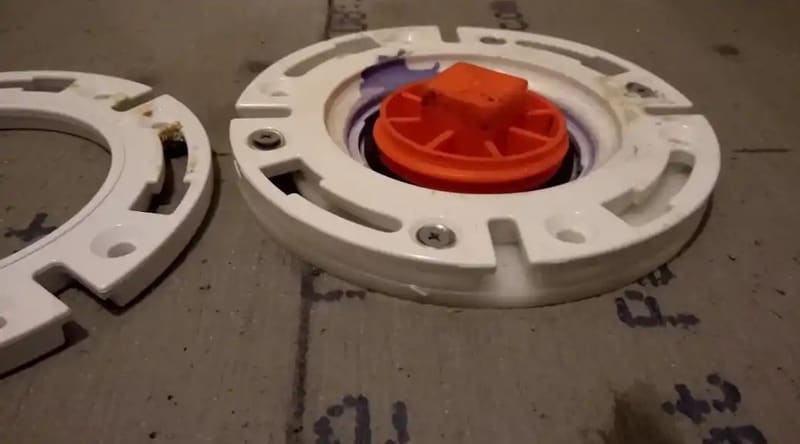
Replacing the flange seal on your RV toilet is generally an easy and inexpensive fix. When you replace the seal, add some Vaseline around the seal as a preventative step to help keep the seal tight, supple, and leakproof.
Problem 5: Black Tank Needs to be Emptied
Depending on how many people live in your RV, your black tank should have a regular emptying schedule. You can’t necessarily count on your black tank sensors to be completely accurate.
Debris can cover the sensors, causing them to be unpredictable. Once you notice a sewer smell in your RV, the first thing to do is to empty your black tank.
The Solution: Head to a Dump Station
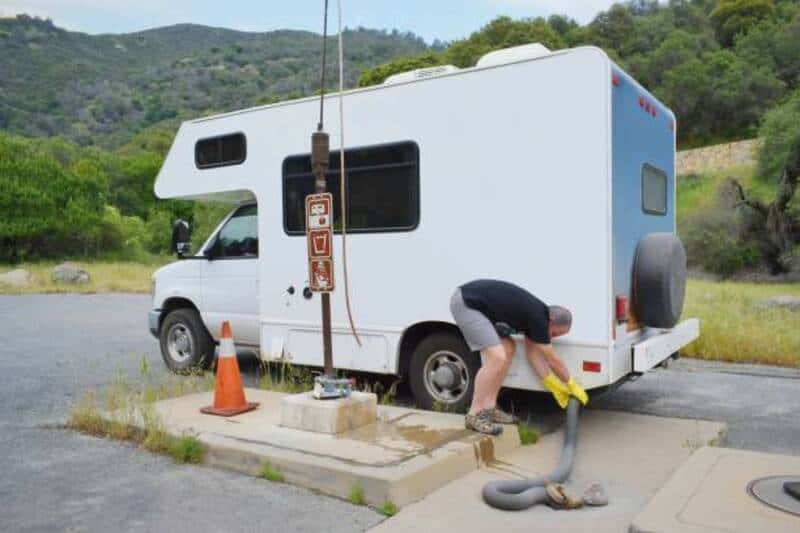
If your sewer smell is simply a “need to dump” problem, then make sure you take care of it immediately. Either head to a dump station or empty your tank into the sewer connection at your full hookup site.
In our RV, we regularly dump the tank and flush it out. Flushing out your black tank helps keep your black tank clean and less smelly.
Problem 6: A Leak in Sewer Pipe or Hose
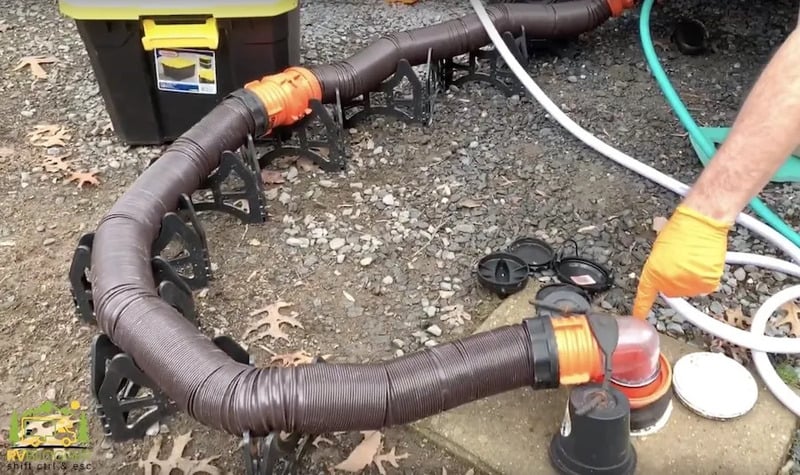
A leak in your sewer pipe or hose needs to be fixed immediately, so the contents of your back tank don’t spill waste on the ground.
It’s a good idea to carry an extra sewer hose with you to replace it if needed. Sewer hoses should be replaced every 36 months. If you full-time RV, make that every 24 months.
The Solution: Duct Tape Patch While You Get It Fixed
A leak in your sewer pipe might take a little more effort to get fixed, but duct tape can be a temporary solution.
The drainpipe which leads from your RV toilet down to your black water tank can become compromised at the connection to the holding tank. Flush your toilet several times and inspect underneath your RV to see if there’s a leak.
Be sure your black tank is nearly full when you do this inspection because the tank’s weight can potentially open the cracked connection and help you verify the damage.
Problem 7: Clogged Black Tank
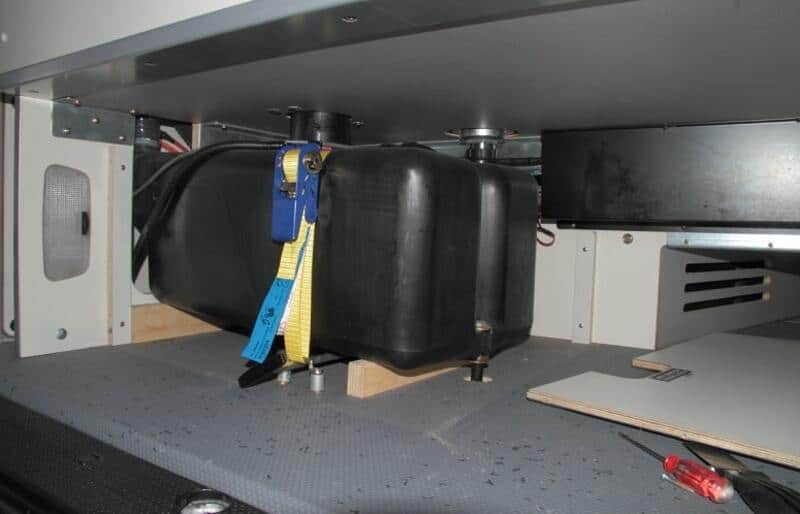
There are several ways your black tank could be clogged. You could have a “poo pyramid,” which is a common RV term. Simply stated, it’s a pyramid of waste and toilet paper that accumulates in a pyramid shape right under your RV toilet.
The pyramid prevents waste from continuing into the tank when it builds up high enough. This usually occurs when you have left your black tank valve open while hooked up to a sewer. Always leave your black tank valve closed unless you dump a full tank.
A compacted tank means that solid waste has accumulated in the bottom of your black tank, preventing waste from exiting the tank when the valve is opened. It can occur if you aren’t using enough water in your tank, not using a high-quality waste-digesting treatment, have a leaky discharge valve, or if waste was left sitting in your tanks during storage.
A blocked toilet line happens when a blockage of toilet paper and solid waste becomes trapped in the pipe that leads from the toilet bowl to the black tank. This can happen when the toilet is not situated directly over the black water tank and has a turn or elbow. To prevent this from happening, you need to use more water than you may think necessary when flushing.
The Solution: Identify the Clog and Troubleshoot
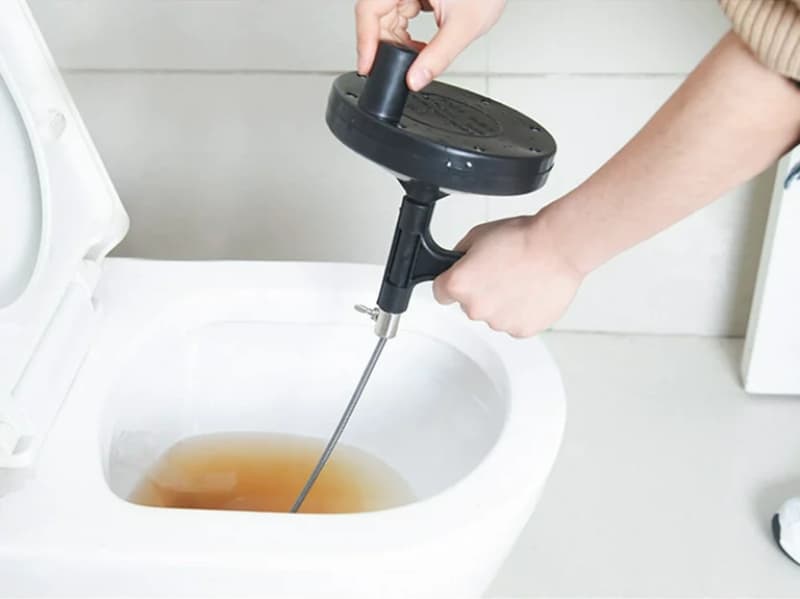
Common signs of a tank clog include RV toilet smells and difficulty dumping the tank. First, identify the type of clog you have before you begin fixing it. Using a toilet snake or auger through your toilet will help you identify a poo pyramid or a blocked toilet line.
Whatever chemical you use to clean your tank can be used at this point. With the black tank closed, pour a healthy portion down into your tank and let it sit for several hours.
Once the chemical has had time to do its work, open the tank and use a hose or flush system to clean it. A flush system lets you connect a hose directly to an inlet valve to power wash your tank. We use our system every time we dump.
If you still have a backup, you might try the chemicals again and then flush the tank. Keep repeating until you have the tank clean.
See our September 2021 edition of RV Camping Magazine for more ways how to remove the “poo pyramid” from your black tank.
Problem 8: Crack or Other Black Tank Damage
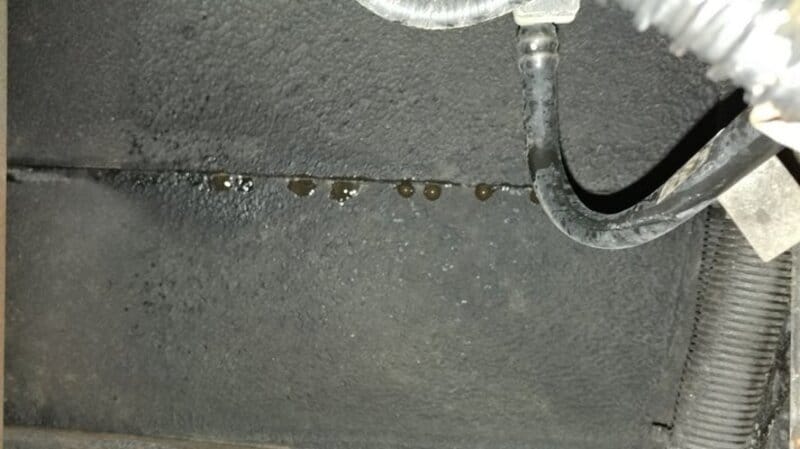
A blown tire can cause you grief on the side of the road and damage the underside of your RV, including your black tank. If you’ve had a flat, you might want to ensure your black tank has no breaks or cracks.
A black tank crack could also result from age and should be inspected often if you smell sewage.
The Solution: Try to Patch It or Trust This Messy Job to a Service Dealer
A new tank will cost around $100 plus labor costs if you can’t do it yourself. You can attempt to patch your tank, but it’s probably best to take it to an RV service center for the work and just get a new tank.
RV service centers also have the advantage of knowing how and where to properly dispose of the black tank since it has residual human waste material.
Problem 9: Roof Vent Fan on When Flushing
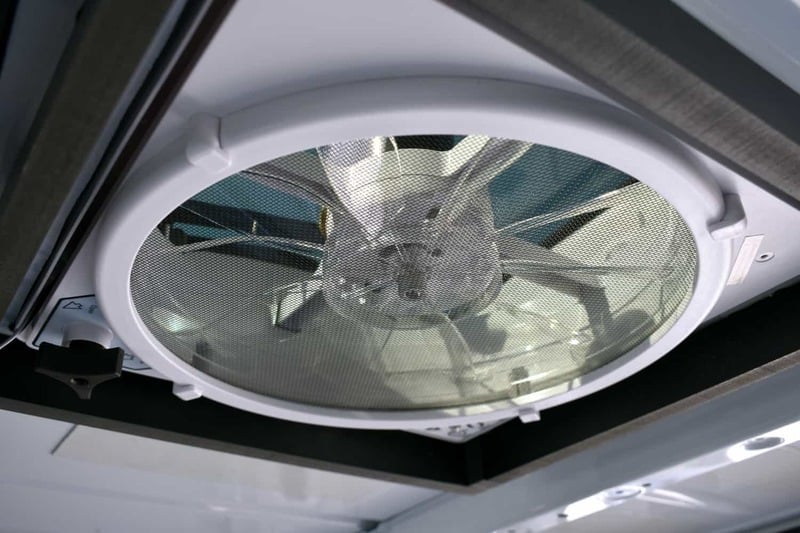
Your first instinct is to turn your bathroom fan on the keep your RV from smelling. This is correct because it’ll help dissipate odors. However, did you know that if you run the fan while you flush, the fan sucks the foul odors and fumes out of your holding tank and into your bathroom?
The Solution: Just Turn Off the Fan Before Flushing
Turn the fan off before flushing and then on again when you are done. That way, odors won’t be sucked out of your black tank and into the RV.
Problem 10: Hot Weather

Hot weather can affect many systems in your RV; your RV black tank is no exception. Superheating your waste can cause odor. Also, the high heat causes the water in your tank to evaporate, and the lack of water allows too many anaerobic bacteria to grow.
The Solution: Park in the Shade and Try Odor-Killer Treatments
Parking in the shade will keep the temperature in your RV down and eliminate odors. Use plenty of water in your RV black tank and treat your tank with a high-quality holding tank treatment.
Problem 11: Black Tank Needs to be Cleaned
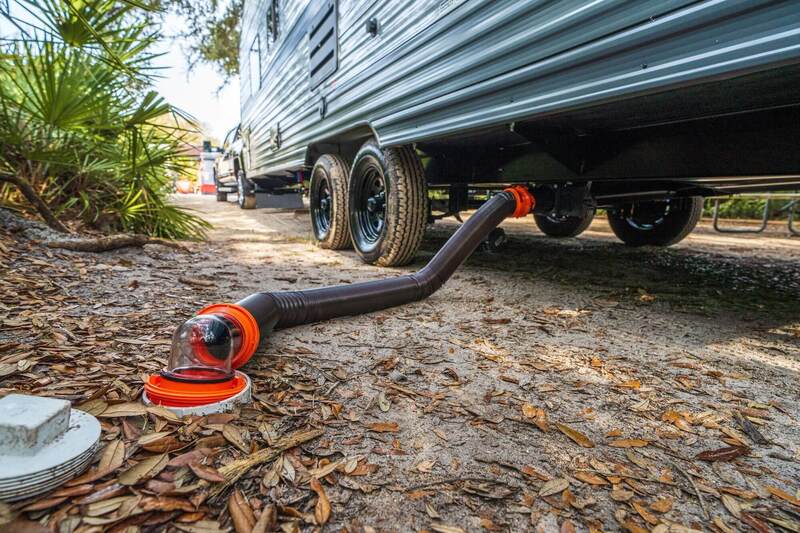
Of course, a black tank that needs to be cleaned will leak odors into your RV.
The Solution: Clean It
Dump your RV holding tanks regularly and include a tank cleaner. Depending on how many people live in the rig, you might be able to dump your tank once a week.
While most RVs have sensors, they’re not always accurate. After you’ve been in your RV for a time, you’ll get a feel for when it needs to be dumped. Sometimes it’ll gurgle or backflow a bit. With those signs and your semi-accurate sensors, you can usually tell when cleaning is needed.
Keeping the lid down will also help contain the RV toilet smells. While you may think it’s better to dump your tank more often, it’s better only to dump when it’s full. Using that flush system every time you dump your tank will help keep your tank from smelling in between dumps.
You want to be sure and use a good cleaner such as Unique Tank Cleaner Liquid for Black Tanks.
Getting Rid of Your RV Toilet Odor FAQ
Can I Put Bleach in My RV Toilet or Black Tank?
Avoid using bleach to clean your black tank. It can dry out rubber seals and ultimately ruin your sewage system.
Does Vinegar Work as an RV Toilet and Black Tank Cleaner?
Vinegar works well to clean and whiten your toilet, particularly with baking soda. Also, it won’t cause a problem with your pipes or seals.
Why Do I Smell Rotten Eggs Near My Water Tanks?
The rotten egg smell could be that the water in your tanks is high in sulfur. Also, bacteria in your RV water heater tank could react with the sulfur and magnesium on the anode rod.
This interaction produces hydrogen sulfide gas, causing the rotten egg odor. Replacing the anode rod should solve the problem.
Do You Recommend Using Drop-In Treatments and Deodorizers?
Yes, holding tank treatments should be a regular part of your RV black tank regimen. Using a bio-enzyme RV toilet treatment that’s septic-safe is preferred by campgrounds, and dump stations and is safe for your home septic tank.
Avoid RV toilet treatments that have formaldehyde. They’re hard to find in today’s market, but they still exist. These lighter blue chemical treatments can eat away at your black tank and kill the bacteria in septic tanks.
Most campgrounds and dump stations no longer allow you to use their sewer systems because of the damage it creates.
Is the Smell in My RV Shower Drain Connected to the Stink in My RV Toilet?
The smell in your shower could be a problem with the P-trap. They hold water and prevent sewer gases from escaping into your living space. The movement of the RV may have displaced the P-trap. Always check this area when you have unwanted smells in your RV.
If it’s not your P-trap, there are liquid RV gray water deodorizers you can pour down the drain that is safe to use.
Should You Attempt DIY RV Toilet and Tank Repairs or Take It to a Pro?
There’s no reason you can’t attempt to DIY your toilet and back tank repairs if you feel comfortable doing it. There are many RV blogs, how-to videos, and much more about whatever it is you’re trying to fix.
You can also check with an RV neighbor who might have some experience or who could lend a hand.
How Do I Prevent the RV Toilet Stink in the Future?
Apply some simple maintenance tips and tricks that are essential to keeping your black tank healthy and getting rid of the RV toilet smell.
Keep plenty of water in the tank by adding a good amount of water with each flush. Make sure you use the best RV toilet sanitizer and enzymatic to prevent clogs and to keep things running smoothly.
Clean and scour your toilet regularly. Don’t skip the maintenance and get repair work done as soon as possible.
Final Thoughts on RV Toilet Smells
In a perfect world, your RV toilet shouldn’t smell. We don’t live in a perfect world, and things, gadgets, and such don’t always function as they should. If you have a bad smell coming from your RV toilet, I’ve mentioned several things you can troubleshoot before you call an RV repair specialist.
Most smells in your RV can be fixed by a good cleaning, good maintenance, and some DIY repair.
Related Reading:
– Do You Really Have to Use RV Toilet Paper?
About the Author:
Terri Nighswonger and her husband Todd have been RVing and work camping for five years with their Cavalier King Charles Spaniel, Newton, and their Minnie Australian Shepherd, Remi.
They originate from the Midwest but plan to enjoy the West for a few years, wintering in Arizona and summering wherever the road may lead. Writing is Terri’s passion, but she also loves hiking, kayaking, walking her dogs, and anything she can do outdoors.


